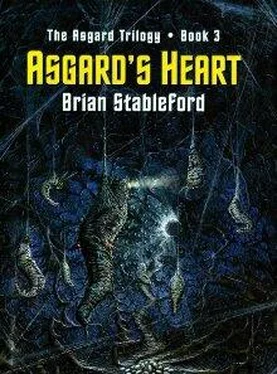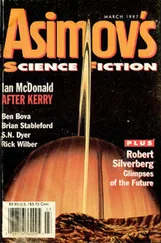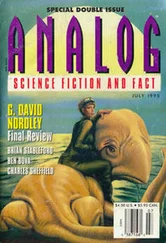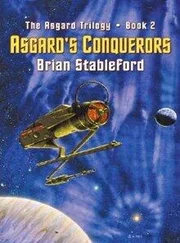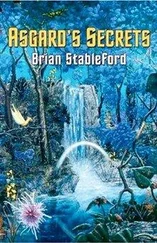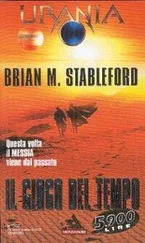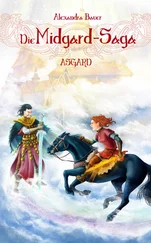That seemed to me like an understatement. I looked down again at the eggs. It didn’t really matter what loathsome kind of thing would emerge therefrom—a monster is only an egg’s way of making an egg, just like a chicken or a man. All life, if my vivid dreams could be credited with putting things in their proper perspective, was part of the same unfolding pattern, the same infinite thread darting from the spool of Creation to be caught by the loom of fate.
In being eaten by some infant creature I would merely be casting the molecules that had briefly been me back into the cauldron of life, where they would be redistributed again and again and again in the aeons to come. Even if the local food chain were blown to kingdom come when the starlet went nova, the atoms would still exist, hurrying through the infinite void until they were gobbled up by greedy microorganisms a billion years from now, to start the story over in some other region.
Looked at in that way, it didn’t seem to matter so much. From that perspective, hardly anything mattered.
But none of that affected the fact that poor Mike Rousseau—the one and only; the most important entity in the universe from the viewpoint of his own tiny, narrow mind—was facing an imminent, agonising, and utterly horrible death without having completed the last leg of his journey to the centre of Asgard.
For myself, I could not imagine any more grotesque failure of the moral order of the universe. It simply wasn’t fair.
At that moment, my eye was caught by a movement. Part of the wall of the spherical nest was being eased aside to allow the ingress of something large and living. For a fraction of a second I nursed the faint hope that it was a friendly humanoid come to set me free, but it just wasn’t a sustainable illusion. The head coming through the gap was far too big and far too ugly to be anyone I knew.
It looked, in fact, like the head of a monstrous centipede, all golden yellow in the beam of my helmet-light, with great antler-like antennae, yellow-irised eyes, and four moving jaws like outsized hedge-trimmers.
“I hate to make a depressing situation seem even worse,” I said, hoarsely, “but I may have just been put on the menu.”
“This macroworld, which you call Asgard, was not always in this location,” said the voice of Saul Lyndrach, who still seemed to be speaking in English. “It came here from another galaxy, in the very distant past. In your terms, it was approximately a million and a half years ago.”
We were moving through a cloud of silvery mist. I could no longer see him, nor could I feel the grip of his hand on my snaky hair. In fact, I could no longer feel my snaky hair. I had an uncomfortable suspicion that what was left of my flesh was still rotting, and I expected that at any moment I might lose my sight entirely as the processes of decay worked their way through my eyeballs. After that, presumably, my hearing would go and leave me isolated in the prison of my dying brain.
I still had enough cells left in that hypothetical brain to marvel at the figure of a million and a half years. When Asgard had arrived in the galactic arm—from the Black Galaxy or somewhere else— Homo sapiens was just a glimmer in the genes of its parent species.
“Asgard came to this region through what you call a wormhole,” the voice went on. “Under certain special circumstances, the starlet can produce enough power to warp the macroworld through stressed space.”
I had no reason to doubt him, but again I had to marvel at the thought. It would take a lot of energy to warp something like Asgard. A hell of a lot of energy—more than a star routinely pipes out. I already knew that there was a small star at the centre of Asgard, but its regular output couldn’t be enough to shift Asgard from here to my home sun; an intergalactic trip would be out of the question.
It was as though he could read the thoughts in my head. “The power for the displacement was supplied by a controlled nova,” he said. “An artificial starlet is more versatile than you might imagine, but it was nevertheless a difficult journey to contrive. Even though there was no question of planning a specific destination, the trick of displacing the whole of the extra energy of the explosion into the creation of a wormhole required considerable cleverness. There was the danger of too large an explosion, which would have converted all Asgard into a tiny supernova and scattered its mass across the desert of intergalactic space. There was also the danger that the starlet’s fusion reaction would be damped down too far once the required energy had been bled into the stresser.
“The intergalactic shift was not totally successful. Asgard did what it was supposed to do, but the fusion reaction was damped down, and though the damage was reparable, given time, it put a severe strain on power-supplies to the levels. More importantly, the invasion had already occurred, and the invaders had come with the macroworld to its new location. That was when the war within Asgard began in earnest, and the reduction in the starlet’s output left its defenders at a disadvantage. The upper levels had already been evacuated—now they were refrigerated. They could never have cooled so extremely by natural processes. The intention was to seal off the lower levels.
“This barrier was not to protect the lower levels, which had already been invaded, but to protect the space outside the macroworld. The builders, riding the starlet explosion, intended to remove themselves into the dark remoteness of intergalactic space. Alas, wormholes do not form randomly, and they are always attracted to gravity-wells—something which makes interstellar travel much more convenient for species like yours. In trying to remove a centre of infection from their own galaxy, the masters of Asgard simply brought it into yours. They knew that this galaxy had been seeded, and when, and they were therefore able to make a rough calculation to tell them how long it would be before interstellar travelers were likely to arrive here. They knew that they would not survive, in their own humanoid form, but they hoped that the army which fought for them in software space might win the war before that time elapsed. That hope proved false. We could not win the war—in the short term, the damage to the starlet gave the invaders the upper hand; in the longer term it proved that we could only contrive a stalemate.
“The builders considered the possibility of trying to move Asgard again, but time was against them. They could not do so immediately because of the damping down of the starlet’s fusion reactor, and once the starlet’s normal functions had been restored they could not make proper preparations because the war was in its most desperate phase. They judged it necessary, instead, to isolate the real space within the starshell in order to protect it from the invaders.
“The war went badly for the builders in those early years. It took such toll of their resources that they could not survive, in their organic forms. No humanoid has set foot on the starshell for hundreds of thousands of years, and those inorganic intelligences which reached the shell itself could not breach the defences protecting the control room—until the Isthomi upset the balance of things.
“The builders had built artificial intelligences to inhabit their machinery which were much more powerful than themselves—gods, if you wish to call them that, but gods manufactured by men who were not so very different from your own kind. But the builders did not trust their servant gods as completely as they might have done. The systems that control the starlet—the systems that control Asgard itself—were not entirely under the control of the programmes inhabiting Asgard’s software space. The most crucial decisions required humanoid hands in order to be implemented—clever hands with nimble fingers. Control of the starlet is by no means a trivial matter of closing certain switches, though there are some effects that can be obtained by crude destructive work—including the interruption of the power supply. In a sense, we were fortunate—the power might have failed hundreds of thousands of years ago, even without the interference of the invaders’ mobiles, just as the starlet may eventually blow up without the intervention of their humanoid instruments. But as things were, the balance of things was maintained, and the contending forces were locked into a potentially endless struggle.
Читать дальше
